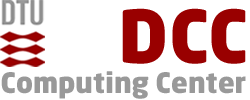Research projects/collaborations
Current research projects conducted in collaboration with the DTU HPC Competence Center are listed here:
- High-Definition Tomography and Heterogeneous Computing
3D imaging is becoming a standard tool in science and industry for nondestructive analysis, due to the advent of affordable scanning devices. At the same time, advances in hardware spur the development of new computational algorithms that can handle the large amounts of data necessary for high-resolution 3D imaging. This results in a new generation of large-scale reconstruction algorithms that allows the imaging and reconstruction algorithms to ”move” from supercomputers to the laboratories in science and industry. Collaboration with Prof. Per Christian Hansen and his research project ”High-Definition Tomography” at DTU Compute on computational methods for large-scale tomography problems, funded by the European Research Foundation. - OMNIVOR: A vortex code for computation of 2D and 3D aerodynamics
The application of vortex methods to wind energy have received regained interest over the last decade. The physical modelling and the computational time requirement of vortex codes may be seen as a compromise between the ones of Blade Element Momentum codes and the traditional computational fluid dynamics (CFD) codes. Yet, a wide range of formulations are possible in vortex methods and different level of complexity may be achieved. In this project we seek to optimize a vortex code for accelerators and the new Intel CPU cluster at DTU Risoe named JESS. Collaboration with PhD Emmanuel Simon Pierre Branlard at DTU Wind Energy.
- Large-Scale Algorithms for Nano-Scale Atomistic Simulations
The goal of this HTF funded project is to develop an atomic-scale device simulator that can compute the electrical characterization of a nano-scale device with 100,000 atoms, using large-scale algorithms and including heating/heat-transport in the simulations. The work aims at developing new high-performance algorithms which will improve the capacity of the simulation tool beyond current state-of-the-art. The focus is on making the Green’s function calculations faster through a reduction of the complexity, e.g., by means of using scattering states as an alternative, or by using ideas from sparse approximations. Collaboration with DTU Nanotech, DTU Compute, and Quantumwise A/S. -
Combined classic and quantum simulation of polypeptides, for biomimetic applications
A novel trend in technology to try to get inspiration on how nature works. Biomimethic technological applications starts to be available, but it is important to understand how nature works, to be able to find new solution. In this project, experimental analysis on carefully selected proteins and small polypeptide is complemented by a combination of classical and quantum simulations, in order to overcome the limitations of each of the methods, and to combine their strength. The specificity of this class of problems calls for the use of techniques that were not designed for this specific purpose, reaching the limits of the commonly used software. In collaboration with Claus Helix-Nielsen group (DTU Physics, DTU environment).
-
New solid Earth models for improving estimates of ice sheet melt and sea level rise
The study of Earth’s surface deformation in response to surface and internal stress is important for understanding the our planet. It allows to get information on the Earth internal structure, not accessible to direct measurements, and its determinant in understanding the future scenarios related to climate changes, ice melting, and sea level changes. However, it requires ever developing theory and correspondingly reliable numerical implementation. This work focus on the development of both novel theoretical models and highly stable and reliable numerical implementations, both for scientific research and technical application. In collaboration with DTU Space, and V.R.Barletta, New Castle University (Grace Nield), University of Tasmania (Matt King), NASA (Shin-Chan Han), TU Delft (R.E.M. Riva) and others.
